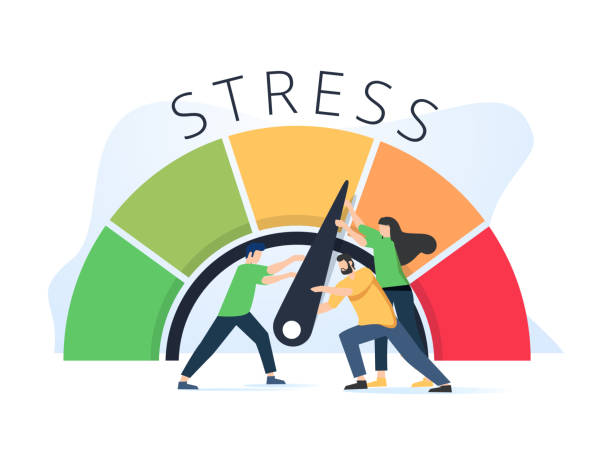10 Stress Signs Might Be Making You Sick.
Title: 10 Warning Signs of Stress That Could Be Affecting Your Health
Although stress is a normal part of life, it can have negative effects on your mental, emotional, and physical health if it is not managed. Periodic stress is acceptable, but prolonged stress can have detrimental effects on your health. The first step to effectively managing stress is identifying its warning signs. In this thorough guide, we’ll look at 10 typical indicators that stress may be causing health problems for you and offer helpful coping mechanisms for managing stress on a daily basis.
10 Stress Signs Might Be Making You Sick.
1. Persistent Headaches
An obvious indicator of stress may be recurrent headaches or migraines. Tension headaches and migraine attacks can result from stiff muscles, especially those in your neck and scalp, when you’re under stress. The development of tension-type headaches, which are characterized by a dull, agonizing pain that lasts for hours or days, can also be linked to chronic stress.
2. Insomnia or Sleep Disturbances
It can be challenging to fall asleep or stay asleep through the night when you’re stressed out. A frequent sign of anxiety is insomnia, which occurs when your mind is constantly racing with concerns and anxieties, keeping you from obtaining the deep, restorative sleep your body need. anxiety can be made worse by sleep problems, which can lead to a vicious cycle that is detrimental to your general health and wellbeing.
3. Digestive Issues
Stress has a significant impact on your digestive system and can cause a variety of gastrointestinal issues, including stomach ulcers, acid reflux, indigestion, and irritable bowel syndrome (IBS). Anxiety causes your body to release anxiety hormones like cortisol, which can cause pain, bloating, and upset stomach by interfering with the regular function of your digestive tract.
4. Muscle Tension and Pain
Your muscles contract and tighten in response to stress, which can create discomfort, stiffness, and tension in your muscles, especially in your back, shoulders, and neck. Prolonged anxiety can worsen pre-existing musculoskeletal disorders, such as temporomandibular joint (TMJ) disease and fibromyalgia, making daily tasks more challenging and lowering your quality of life overall.

5. Weakened Immune System
Long-term anxiety weakens your immune system, increasing your vulnerability to infections, diseases, and long-term medical disorders. Anxiety chemicals such as cortisol have the potential to disrupt immune cell function, decreasing the cells’ capacity to fend against infections and making you more susceptible to the flu, colds, and other infectious diseases.
6. Changes in Appetite
Anxiety can mess with your eating habits, which can cause hunger swings and changes in weight. Unintentional weight loss may result from some people’s increased appetites for comfort foods that are heavy in fat, sugar, and salt, or from complete appetite loss. These dietary adjustments may worsen anxiety levels and have an impact on your general health, nutritional status, and nutritional status.
7. Mood Swings and Irritability
Your mental health suffers when you are under anxiety, which can cause mood swings, irritation, and emotions of frustration or rage. Prolonged anxiety can throw off the neurotransmitter balance in your brain, which can impact dopamine and serotonin, two chemicals that regulate your mood. You might thus become irritable, unstable emotionally, and find it difficult to handle daily pressures.

8. Fatigue and Low Energy
Prolonged anxiety depletes your energy reserves, making you feel worn out, listless, and weak. Fatigue brought on by anxiety can make it difficult for you to focus, concentrate, and carry out everyday duties, which can lower your productivity and lower your quality of life in general. It is possible to wake up feeling exhausted and lacking in energy, even after getting a full night’s sleep, and find it difficult to tackle the next day.
9. Difficulty Concentrating
Anxiety can affect your cognitive abilities, making it harder to focus, recall details, and make wise judgments. Stress causes your brain to give priority to your survival instincts over higher order thinking, which can cause mental disorientation, cognitive fog, and poor judgment. Persistent stress can worsen anxiety and anxiety by interfering with your performance at job, school, or other aspects of your life.
10. Social Withdrawal and Isolation
Stress can have an adverse effect on your social interactions, resulting in emotions of social disengagement, loneliness, and isolation. It could be difficult for you to establish good relationships, engage in social activities, or connect with others while you’re stressed. Withdrawing from your support network can increase feelings of anxiety and isolation and prolong a cycle of emotional anguish and loneliness. Social support is crucial for managing stress.

NOTE: You can also Read: New Visa and Visit visa policies for Dubai UAE 2024
Identifying the early indicators of anxiety and taking preventative action to successfully manage it is the first step. You may lessen the damaging effects of anxiety on your health and wellbeing by listening to your body’s signals and dealing with stressors as soon as they arise. You can develop resilience and manage anxiety more skillfully by including stress-reduction strategies like mindfulness, relaxation exercises, physical activity, and social support into your daily routine.
Always remember that if you’re finding it difficult to manage your anxiety on your own, you may always seek professional assistance from a therapist, counselor, or healthcare provider. Setting boundaries, emphasizing self-care, and using constructive coping mechanisms can help you take back control of your life and develop equilibrium, tranquility, and wellbeing in the face of life’s unavoidable stresses.




